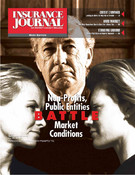Insurance industry trade groups are hopeful that the Federal Communications Commission’s recent decision to stay until Jan. 2005 a controversial rule prohibiting all unsolicited advertisement faxes will give business groups an opportunity to agitate for a less restrictive regulation.
Part of the FCC’s new Do Not Call rule issued July 25, the Do Not Fax provision would eradicate the previous exemption for unsolicited faxes to consumers with whom vendors had a previously existing business relationship (EBR), defined as a financial transaction within the last 18 months or a substantive customer inquiry within the last three months.
Do Not Fax would prohibit all unsolicited advertisement faxes, whether from business-to-consumer, business-to-business, or charity-to-consumer. The rule also would require written consent from a recipient before any fax containing a commercial solicitation could be sent.
Business groups and non-profit organizations assailed the new rule, which was supposed to go into effect Oct. 1, 2003, along with Do Not Call.
The main objection to the rule was the lack of an EBR exemption, meaning for example that an agency could not send an advertisement fax to a current customer, let alone a prospect. Furthermore, by requiring written consent to be sent a fax, opponents have claimed the Do Not Fax rule would make it much more difficult for agents and insurers to pursue referrals.
“Sure, you should get somebody’s consent before sending an ad to them,” said Patrick Watts, assistant vice president with the Alliance of American Insurers. “But this signature requirement is a hassle both from a business that has a previous relationship with someone and from the point of view of a consumer. If I’m talking to someone and say, ‘Go ahead and fax that to me.’ The next thing I get is something asking me to sign so I can get that fax.
“I said, ‘Send me the fax and now you’re hassling me for a signature,'” Watts added. “In the light of day this requirement is not a good idea.”
The FCC said in a statement the stay would give businesses time to obtain the written permission and signatures required to send advertisement faxes. But the order to stay the Do Not Fax rule was also an implicit admission that some changes to make the rule less restrictive are probably in order.
“In addition to allowing people to come into compliance, this allows 16 months to file for reconsideration,” said Rosemary Kimball, an FCC spokeswoman. “So you know it’s still in play. We’re expecting to hear from a lot of people who have better ideas. Our goal is to eliminate situation where consumers are paying to get unsolicited faxes. We’re willing to hear about anybody’s ideas of a better way to do it.”
Lobbyists for the Independent Insurance Agents and Brokers of America, which has already submitted a request for reconsideration on the Do Not Fax rule, said they hoped the FCC would at least clarify the rule’s definition of an EBR if not scrap the rule altogether. However, Kimball said the agency is unlikely to do so.
“We extended the deadline,” she said. “That’s as far as we’re planning to go with it at this point.”
Maria Berthoud, a lobbyist for IIABA, said that in lieu of FCC action within weeks, “we are going to be pursuing a congressional strategy. We have the support of key players in the House leadership and we’re now trying to find the legislative home for such a rule [exempting unsolicited faxes for EBRs], what vehicle it would get attached to.”
Julie Gackenbach, assistant vice president for government relations with the National Association of Independent Insurers, said “anything short of just pulling the section will engender an enormous amount of objections from the business community. The FCC does feel pressure to rein in phone calls and faxes, but the fax requirement simply made this unworkable.”
As for the more well-known provision of the FCC’s Do Not Call rule, which goes into effect Oct. 1, prohibiting telemarketing calls to residential phone numbers registered with the agency’s list does apply to insurers and insurance agencies. The IIABA has filed a request for reconsideration based on the argument that the McCarran-Ferguson Act prohibits any federal regulation of the insurance business.
Gackenbach said that another medium often used for marketing, e-mail may also soon be targeted by Congress. Nothing is likely to move this year—”there just aren’t a lot days left,” she said—but a bill requiring e-mail solicitors to provide a valid address, and opt-out does have the support of Rep. Billy Tauzin (R-La.), chairman of the House Energy and Commerce Committee.
To comment on this story, email koreilly@insurancejournal.com
Topics Agencies Legislation
Was this article valuable?
Here are more articles you may enjoy.


 Commercial P/C Market Softest Since 2017, Says CIAB
Commercial P/C Market Softest Since 2017, Says CIAB  Marine Insurers Cancel War Risk Cover as Iran Conflict Escalates
Marine Insurers Cancel War Risk Cover as Iran Conflict Escalates  Zurich Insurance Said to Near Beazley Deal Funded by Equity Sale
Zurich Insurance Said to Near Beazley Deal Funded by Equity Sale  Sompo Holdings Completes Acquisition of Aspen, Taking it Private
Sompo Holdings Completes Acquisition of Aspen, Taking it Private 


